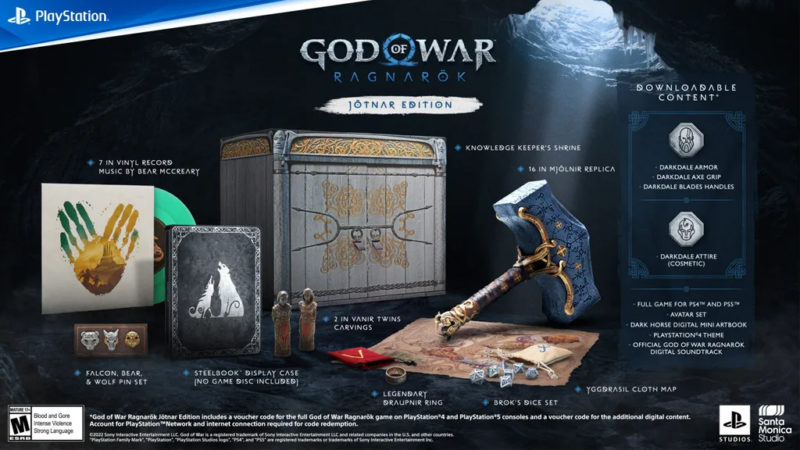God of War Ragnarok bundles include Steelbook cases with no discs inside

On Wednesday, Sony released an unboxing video highlighting all the bonuses included in the premium Collector’s Edition and “Jotnar Edition” of November’s God of War Ragnarok. But if you watched through that video, you might have noticed one conspicuous element missing: a physical copy of the game.
The omission of a disc is especially odd given that both special editions include the kind of Steelbook display case you would usually use to store your game disc in style. In this case, though, the PlayStation Blog specifically points out that there is “no game disc included” with the Steelbook. If you want a copy of the game to put inside that case, you have to shell out an additional $60 or $70 for the physical Standard Edition of the game. Otherwise, you’re stuck with the digital download code that comes with the pricier special editions (while Sony hasn’t announced pricing yet, similar Collector’s Editions from Sony have run $200 and up in the past).
Players who pre-order a Ragnarok Collector’s Edition won’t even be able to preload their digital copy of the game to play immediately on launch day. Instead, they’ll have to wait for physical receipt of their package and the “printed voucher code” included inside, then start what could be a lengthy download, depending on their connection speed.
Leaving discs out of the priciest packages isn’t a completely new move for Sony. February’s release of Horizon Forbidden West featured a $199 Collector’s Edition and a $229 “Regalla Edition” that were also full of physical bonuses but lacking in physical game discs. Forbidden West did come in a limited $70 to $80 “Special Edition,” though, which included a Steelbook, mini art book, and a disc-based copy of the game. With Ragnarok, the only physical copies will be available in the bare-bones “Standard Edition” (and a “Launch Edition” that includes some free DLC).
Sony isn’t completely alone in this trend, either. May’s release of the remastered Mass Effect: Legendary Edition launched alongside a “Legendary Cache” bundle of physical collectibles that didn’t include a copy of the game at all (physical or digital). And back in 2020, Ubisoft announced that some of its $199 collector’s edition games for the Xbox would include download codes rather than discs (though physical editions were also available at one point).
A shrinking niche?
The lack of physical discs in these collector’s editions is more than a little weird, considering how many other tangible products are packed into these bundles. After all, you’d think the kind of person willing to spend hundreds of dollars for rings, dice, statues, vinyl soundtracks, and other physical ephemera surrounding a game would also like a physical copy of the game.
But that isn’t necessarily a given these days. Keep in mind that a good number of console owners are now playing on an Xbox Series S or a PS5 Digital Edition that doesn’t even have a disc drive. Early retail spot checks suggested that roughly a quarter of all PS5 owners may not be able to play a disc-based game, for instance.
That chunk of the audience probably includes many players that still want physical tchotchkes representing their love of their favorite games, even if they don’t care about playing those games on physical discs anymore. And while Sony could split its collector’s editions into physical and digital versions (or simply bundle both together, a la “disc to digital” movie releases), that could end up more costly and complicated for an already constrained supply chain.
Remember, too, that this is all happening against the backdrop of an industry where physical game releases are increasingly becoming a niche part of the market. Sony’s latest earnings report shows that 66 percent of its game sales in the last fiscal year came as digital downloads rather than discs, up from 43 percent in the 2018 fiscal year. And Sony’s number might actually be low for the industry; Capcom says a full 80 percent of its sales are digital these days and that it expects that ratio to grow in the coming years.
In other words, the same trends leading to GameStop stores that have more Funko Pops than games may be leading to collector’s editions that don’t have physical games at all. As odd as it seems, physical copies of the games themselves might be becoming the least “collectible” part of the video game collector’s market these days.
https://arstechnica.com/?p=1864820